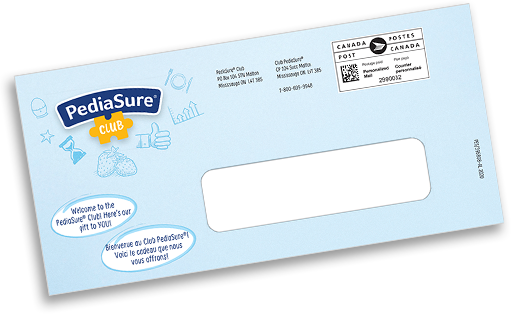JOIN THE CLUB!
Sign up to save up to $50‡ on PediaSure® and receive valuable tips and great-tasting recipe ideas.

‡ Offers may vary.
It happens to everyone once in a while: you missed breakfast or skipped lunch and, in a few hours, you are feeling it. You may be distracted by hunger, unable to concentrate, or even feeling grouchy. Kids experience the same symptoms from skipping meals, and it can affect their behaviour and ability to concentrate.
When a child’s brain and body get the right nutrition, there is a marked difference in the child’s mood, ability to focus, and capacity to learn. One way to help your child choose healthy foods is to eat healthy, regular meals yourself. Kids will want to mimic what they see you do. Having a well-balanced diet and eating regular meals can help prevent that distracted, grumpy feeling. Growing children require more calories per body weight than adults do, so healthy snacks are very important to help them meet their energy needs throughout the day. Make sure you have nutritious snacks on hand when crunched for time or the day hasn’t gone as planned.
Physical activity requires energy, and we get energy from calories provided by the foods we eat. A balanced diet will help ensure your child has the energy to lead an active life. The body gets the calories it needs for energy from carbohydrates, protein, and fat.
Carbohydrates supply energy through foods like whole grains, vegetables, and fresh fruits (consumed with the skin when possible). These foods also contain fibre, which promotes regularity. Protein-rich foods help build and repair body tissues. Protein also helps build strong muscles. Healthy fats, such as Omega-3 fatty acids, support the normal physical development of the brain and eyes. When protein, carbohydrates, and fat are consumed together, digestion is slowed, and energy is provided over a longer period of time.
Being physically active helps kids feel better in so many ways. A study showed that kids 7-9 years old who were physically active on a regular basis were not only fitter, but also demonstrated better attention, decision making, and multitasking skills than kids who were less physically active1 — all tasks that help kids perform both in school and in life.



Cognitive development is all about brain health. Cognition refers to activities of the brain such as thinking and reasoning. The brain is nearly 90% its final size by the time a child is 3 years old. Your child’s memory, ability to learn language, perform tasks, reason, concentrate, solve problems, and more depend on cognitive development.
Many important nutrients work together to contribute to a healthy brain:
DHA is the most prominent fatty acid in the brain,2 and since the body does not produce enough on its own, kids need to consume it in the diet to meet the body’s needs. We can get DHA from foods such as fatty fish, seafood, and Omega-3 fortified foods.
The immune system protects your child from disease and infection. It may surprise you to know that between 70 and 80% of your immune system is located in your digestive system. Hence, digestive health is critical to maintaining a healthy immune system.
Dietary fiber plays an important role in supporting a healthy digestive system. There are two types of fibre: soluble and insoluble. Soluble fibre helps reduce total blood cholesterol levels. It is found in foods such as oats, legumes, and some fruits and vegetables. Insoluble fibre promotes regularity by increasing stool bulk, or “roughage”, and is found in whole grains and some vegetables and fruits. These two types of fibre work together in the digestive tract to support immune health.
In today’s world of fast food and overall poor eating habits, kids can develop an unhealthy relationship with food early in life. However, parents have more influence over their kids’ attitudes toward food than they may realize. It’s common for parents to insist on a "clean plate" at the end of a meal or to force kids to eat things they don’t like. While this is often done with good intentions, it can lead to the child having negative feelings about mealtime and nutritious foods.
A responsive feeding approach has been shown to help foster a positive behaviour toward food.3 By following the child’s cues to indicate hunger and fullness, parents can avoid mealtime turning into a fight. Children decide whether and how much to eat from what is offered. The key is for parents to offer a variety of foods with a scheduled meal and snack pattern full of the nutrients kids need.
One of the best things you can do to improve the emotional health of your children concerning nutrition is to instill positive attitudes and build a healthy relationship with food. It has been proven that parents have a definite influence on their kids’ relationship with food later in life,4 but modeling the behaviour we want for our children is not always easy. Set a positive example for kids at mealtime by serving nutrient-rich foods, allowing kids to make decisions about what they eat (and even if they eat), and eating healthy portions of food yourself.



Emerging science shows a strong link between nutrition and academic performance.
Breakfast is especially important for kids attending school. Studies have shown that consuming breakfast had a positive impact on children’s attention at school.5 Eating breakfast foods high in dietary fibre can help kids to feel full longer and therefore not be distracted by hunger later in the morning, helping improve attention and focus on schoolwork.
However, it’s not just whether a child is hungry that affects school performance. Research indicates the quality of foods children eat also impacts cognition. A Canadian study (The Children’s Lifestyle and School-performance Study) looked at the impact of overall diet quality on school performance in 5th graders and found that diet quality was associated with better academic performance.6 This highlights the importance and impact of consuming a variety of nutrient-rich foods, not only on your child’s health but also on their academic performance.
References:
1. Hillman CH, Pontifex MB, Castelli DM, Khan NA, Raine LB, Scudder MR, Kamijo K. Effects of the FITKids randomized controlled trial on executive control and brain function. Pediatrics 2014;134(4):e1063-e1071. doi:10.1542/peds.2013-3219.
2. Weiser MJ, Butt CM, Mohajeri MH. Docosahexaenoic Acid and Cognition throughout the Lifespan. Nutrients 2016;8(2):99. doi:10.3390/nu8020099.
3. Black MM, Hurley KM. Responsive Feeding: Strategies to Promote Healthy Mealtime Interactions. Nestlé Nutrition Institute Workshop Series 2017;87:153-65. doi:10.1159/000448965.
4. Branen L, Fletcher J. Comparison of College Students' Current Eating Habits and Recollections of Their Childhood Food Practices. Journal of Nutrition Education 1999;31(6):304-10. doi:10.1016/S0022-3182(99)70483-8.
5. Adolphus K, Lawton CL, Champ CL, Dye L. The Effects of Breakfast and Breakfast Composition on Cognition in Children and Adolescents: A Systematic Review. Advances in Nutrition (Bethesda, Md.) 2016;7(3):590S-612S. doi:10.3945/an.115.010256.
6. Florence MD, Asbridge M, Veugelers PJ. Diet quality and academic performance. The Journal of School Health 2008;78(4):209-41. doi:10.1111/j.1746-1561.2008.00288.x.



